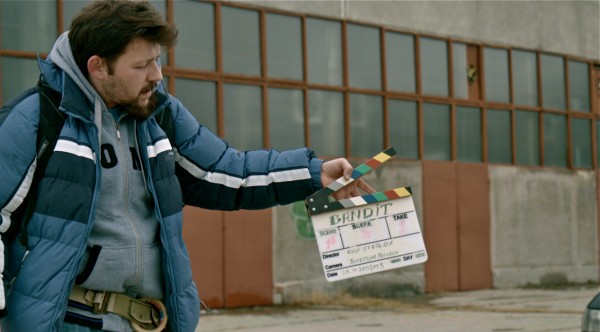Now that we know the details of V-Log for the GH4 it’s a good time to put your gear obsession on hold for a few minutes. So if you remember, we told you recently that me and Vlady have been working our butts off to create a no-nonsense and practical No Budget Filmmaking Guide for you, and as we put the final touches on it and tell you all about it, I thought it would be a good time to reflect on the biggest lessons I learned from shooting my debut feature film, which I did with minimal crew, even less gear, and some pocket change.
Top 10 Lessons I Learned While Shooting My Debut No Budget Film
- Always Have a Plan B (and then C)
I’ve had actors who had to drop at the last minute and locations I had to shuffle in order to make full use of a shooting day. No matter what happens, you have to have a Plan B and a backup plan in case Plan B goes to hell. Plan for the worst, as things will go wrong, that’s just guaranteed and part of the game.
- No Matter How Much Money You Have, It Will Never Be Enough (but that shouldn’t stop you from making your film)
Money goes a long way, but no matter how much you have for your film, you can squander it if you don’t plan properly. Concenrate on putting money on the screen, as the latest camera kit or fancy audio gear won’t necessarily make your film better. You can do with a lot less if you focus on what’s more important – shoot economically and plan your shots very well. And no, you probably don’t need that crane shot.
- Listen To Your Actors and Crew, Take Feedback
They will look for your guidance on set, you have to be on point and focused 110% of the time. Your actors’ intuition and experience can help you craft a better scene and improve their performance. You never know when that awesome take is going to happen so if your DP or actor have a different idea on how to approach a shot or a scene – listen, take their feedback and see if it works.
This doesn’t mean that you don’t have to stick to your guns, but don’t bury your head in the sand and be stubborn just because you are directing your first film. Keyword here – first film.
- Borrow, Beg & Steal (Locations) But Keep Your Dignity In the Process
Use all the tools at your disposal, you’d be surprised to find out that your uncle owns that tiny cottage or property that you can use for a scene. Or your friend who owns a restaurant or a car repair shop. Approach them and be honest, but don’t beg. Start with people who are close to you can’t realy say no to you. If you have to go out of your circle of family and friends, do it professionally – ask, but don’t beg if they say no. And they will. No can be a good answer sometimes. You can find something better. When there is a will, there is a way.
- Life Experience Helps
I was 31 and change when I shot my debut feature film. Age is just a number in my book, life experience is what counts. Use it to imbue your film with your own experience. Those of us who’ve been around the block a few times and weathered a few storms have something most 21 year old’s don’t. And you can’t buy experience or crowdfund it. When life beats you up a bit, use it to your advantage.
- Prep First, Shoot Later
I did a poor job in pre-production and this nearly ruined my film. I had to deal with the consequences on set and it won’t be a pretty sight. You’d loose sleep over it and doubt yourself every day on set.
Spent that extra day rehearsing that dramatic scene with your female lead, or do take the time to block the scene in advance and not when you show up on set and figure out that the hallway is too damn narrow for anyone but your actor to walk through and there is no room for your sound recordist…
Locations, logistics – how you move your film company from one place to another, how and when your schedule should looks like… Storyboards, camera tests, wardrobe, make-up… the more you do before you set foot on set, the smoother your shoot will go.
- Know What You Want (and Don’t Want)
Your job as a director is to inspire your crew every day and to know what you want and when to say no to yourself. There were times when we were set to film a very important scene with an experienced actress and I stood there not knowing what I want from her performance. I wish the Earth beneath me would open and swallow me… know what you want beforehand. Be specific, concise and most of all – be nice and respectul of everyone on your set no matter they experience level.
- Surround Yourself With People Who Are More Talented and Experienced Than You
Someone way smarter than me said this once… I read it somewhere. And it’s true – get the best DP you can get, hire the most talented actors you can get. Learn from your sound recordist and make up artist. Observe and be a sponge. Get off your soapbox and listen to what they say. Every day on set is a learning experience that will help you get better at what you do.
- Know Who You Are Making Your Film For
Start with your audience before you even write that opening slugline in your script. Know how you’ll market and sell your movie not just to distributors and sales agents – but how you’d sell it to your neighbour in an elevator if you had 30 seconds to pitch it to them. Know your genre and know what your audience expects, but then also make it your own and fresh. That’s the more difficult part.
Draw a poster in your head even before you write that script. What would your tag line be? I try to envision what someone would say to their friend after seeing your film at the cinema? If it takes more than 10 seconds to explain, start over…
- Giving Up (Is Not An Option)
There’s lots of first time filmmakers, but not a whole lot 2nd time, 3rd time and those who make a career out of it. Your first film will be one of the most difficult challenges that you’d have to overcome in your life. It’s like this daunting hill you cannot climb, this towering monolith of perpetual doubt… there will be many times when you’d want to quit and say – “to hell with this crap… it’s not worth it” to that I say – do it – this way there will be one less film for me to compete against for eyeballs.

Our filmmaking guide will include 2 case studies, detailing our experience on our debut feature films “Bandit and “The Sixth Day” as well as behind the scenes, video tutorials and complimentary materials essential to every no budget film production.
Our guide will be available exclusively right here on 4Kshooters.net with pricing and full details to be revealed upon release next Tuesday, 8th September.
Meanwhile, if you want to learn more about some of the gear we used for our projects GET OUR SPECIAL FREE REPORT HERE.
Disclaimer: As an Amazon Associate partner and participant in B&H and Adorama Affiliate programmes, we earn a small comission from each purchase made through the affiliate links listed above at no additional cost to you.
Claim your copy of DAVINCI RESOLVE - SIMPLIFIED COURSE with 50% off! Get Instant Access!






Good advices!